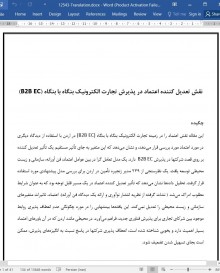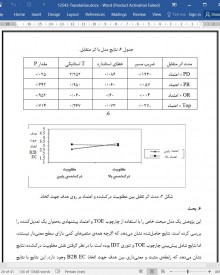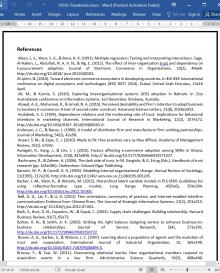
دانلود مقاله نقش تعدیل کننده اعتماد در پذیرش تجارت الکترونیک بنگاه با بنگاه (B2B EC)
چکیده
این مقاله نقش اعتماد را در زمینه تجارت الکترونیک بنگاه با بنگاه (B2B EC) در اردن با استفاده از دیدگاه دیگری در مورد اعتماد مورد بررسی قرار میدهد، و نشان میدهد که این متغیر به جای تأثیر مستقیم یک تأثیر تعدیل کننده بر روی قصد شرکتها در پذیرش B2B ECدارد. یک مدل تعامل گرا در بین عوامل اعتماد، فن آورانه، سازمانی و زیست محیطی توسعه یافت. یک نظرسنجی از 239 مدیر زنجیره تأمین در اردن برای بررسی مدل پیشنهادی مورد استفاده قرار گرفت. تحلیل دادهها نشان میدهد که تأثیر تعدیل کننده اعتماد در یک مسیر قابل توجه بود که به عنوان شرایط مطلوب ادراک میشد ( نشات گرفته از نظریه انتشار نوآوری و ارائه یک دیدگاه فن آورانه). اعتماد، تاثیرات متغیرهای سازمانی و زیست محیطی را تعدیل نمیکند. این یافتهها بینشهایی را در مورد چگونگی عدم انعطاف پذیری روابط موجود بین شرکای تجاری برای پذیرش فناوری جدید، فراهم میآورد. در محیطی مانند اردن که در آن باورهای اعتماد بسیار اهمیت دارد و بخوبی شناخته شده است، انعطاف پذیری شرکتها در پاسخ نسبت به انگیزههای پذیرش، ممکن است بجای تسهیل شدن تضعیف شود.
1. مقدمه
همانطور که بسیاری از اقتصادهای ملی از طریق تجارت جهانی به طور فزایندهای به هم وابسته شدهاند، تجارت الکترونیک بنگاه با بنگاه (B2B EC) هم برای کشورهای توسعه یافته و هم کشورهای در حال توسعه به موضوع مهمی تبدیل شده است. B2B EC به عنوان فن آوریهای مبتنی بر اینترنت ظاهر میشود که معاملات بین خریداران و فروشندگان (شرکای تجاری) را در سطح محلی و در سراسر جهان تسهیل میکند (Alsaad، Mohamad, & Ismail، 2015؛ Sila، 2015). در حالی که فن آوری B2B EC، ارتباط مؤثر بین شرکای تجاری را نوید میدهد، بسیاری از شرکتها تمایلی به پذیرش و استفاده از این فن آوری ندارند و علت عمده آن ریسکهای مختلف مربوط به انجام معاملات بواسطۀ آنهاست. مقالات موجود نشان میدهد که عدم وجود اعتماد بین شرکای تجاری، اغلب مانع از استفاده از فن آوری B2B EC در معاملات شرکای تجاری میشود (Hart & Saunders، 1997؛ Son، Tu، & Benbasat، 2006؛ Teo، Lin & Lai، 2009). بیشتر تحقیقات در مورد نقش اعتماد بر مبنای این فرض است که باورهای اعتماد در مورد یک شریک تجاری موجب کاهش تردید در مورد آسیب پذیریهایی مثل تسهیم اطلاعات، رفتارهای فرصت طلبانه، عدم توازن قدرت و تعارضات میشود. بنابراین، فرض میشود که اعتماد بالا در مورد یک شریک تجاری خاص، احتمال پذیرش ریسک ذاتی در پذیرش B2B EC را توسط پذیرندگان افزایش میدهد و در نتیجه اعتماد بیشتر، به پذیرش EC B2B کمک میکند (Chong & Bai، 2014؛ Hart & Saunders، 1997؛ Pan، 2013؛ Son و همکاران 2006). اگر چه، این فرضیه اعتماد، در بین مقالات مربوط به پذیرش بسیار شایع است، شواهد تجربی بسیاری نشان میدهند که نقش انگیزشی اعتماد در پذیرش EB B2B زیاد قابل توجه نیست (برای مثال AlHakim، Abdullah، & Ng، 2012؛ Chong & Bai، 2014؛ Hart & Saunders، 1998؛ Huang، Janz & Frolick، 2008؛ Saunders & Clark، 1992؛ Sila 2010، 2013).
8. محدودیتها و تحقیقات آینده
با توجه به اینکه هیچ تحقیقی بدون محدودیت انجام نمیگیرد، بایستی در تفسیر نتایج پژوهش، چندین موضوع را در ذهن مهم قلمداد کرد. در این مطالعه پیشفرض گردیده است که سختگیری درون سازمانی و ترجیح روابط بین فردی در سطح بالایی از اعتماد ایجاد گشته است. در مطالعات آینده ممکن است به نقش تعدیلکننده در سایر شاخصهای اینرسی درون سازمانی مانند سن شبکه، اندازهی شبکه و حالت موقعیت در شبکه توجه گردد. علاوه بر این، چون به اعتماد بهعنوان مقدم رفتار سازمانی در بخش بزرگی از پژوهشهای انجامگرفته کمتر توجه شده است، عنصر انسانی ممکن است بهعنوان واسطهی مؤثر اعتماد در نظر گرفته شود. قطعا تحقیقات بیشتری جهت افزایش پایایی و روایی مورد نیاز است و کاربرد این نتیجه با بهکار بردن آن در زمینههای مختلف قابل بررسی میباشد.
Abstract
This paper revisited the role of trust in Business to Business Electronic Commerce (B2B EC) settings in Jordan, using an alternative view on trust suggesting that this variable has a moderating effect rather than having a direct impact on the intentions of firms to adopt B2B EC. An interactionist model among trust and technological, organizational, and environmental factors was developed. A survey of 239 supply chain managers in Jordan was used to test the proposed model. Analyzed data shows that the moderating impact of trust was significant in one path, which was perceived desirability (stemming from the diffusion of innovation theory and representing the technological view). Trust did not moderate the impacts of organizational and environmental variables. The findings provided insights into how existing relationships between trading partners may not be flexible enough to absorb new technology. In a context in which trust beliefs are well established and critical such as Jordan, the flexibility of firms in responding to adoption motivations may be hampered rather than enabled.
1. Introduction
As many national economies have become increasingly interdependent through global trade, Business to Business Electronic Commerce (B2B EC) has become an important issue for both developed and developing countries. B2B EC manifests itself as Internet-based technologies that mediate and facilitate transactions between buyers and sellers (trading partners) locally and around the world (Alsaad, Mohamad, & Ismail, 2015; Sila, 2015). While B2B EC technologies promise to link trading partners in an effective manner, many firms have been reluctant to adopt and use these technologies, mainly because of the various risks associated with conducting transactions through them. Existing literature suggests that a lack of trust between trading partners has frequently prevented trading partners from transacting using B2B EC technologies (Hart & Saunders, 1997; Son, Tu, & Benbasat, 2006; Teo, Lin, & Lai, 2009). Much of the research investigating the role of trust is based on the premise that trust beliefs about a trading partner mitigate the uncertainties related to vulnerabilities such as information sharing, opportunistic behaviors, imbalance of power, and conflicts. Thus, a higher level of trust about a specific trading partner is posited to increase the likelihood of potential adopters to take risks inherent in adopting B2B EC, and thus greater trust facilitates the adoption of B2B EC (Chong & Bai, 2014; Hart & Saunders, 1997; Pan, 2013; Son et al., 2006). Although this trust proposition is widespread in the adoption literature, the cumulative empirical evidence suggests that the motivational role of trust on the adoption of B2B EC is less pronounced, see for example (AlHakim, Abdullah, & Ng, 2012; Chong & Bai, 2014; Hart & Saunders, 1998; Huang, Janz, & Frolick, 2008; Saunders & Clark, 1992; Sila, 2010, 2013).
8. Limitations and future research
In interpreting the research results, keeping several issues in mind is important, as no research exists without limitations. This study presumes that inter-organizational rigidities and the preference of interpersonal relationship are embedded in a high level of trust. Future studies might look into the moderating role of other indicators of inter-organizational inertia such as network age, network size, and status position in network. Additionally, because trust as antecedent of organizational behavioral is less pronounced in a large body of the literature, the human element might mediate the influence of trust. Further research is definitely required to enhance and verify the validity and applicability of this outcome by applying it in different contexts.
H1. Perceived desirability positively influences a firm's intention to adopt B2B EC.
H2. An organization's readiness positively influences a firm's intention to adopt B2B EC.
H3. Top management support positively influences a firm's intention to adopt B2B EC.
H4. Competitive pressure positively influences a firm's intention to adopt B2B EC.
H1. مطلوبیت ادراک شده تأثیر مثبتی بر قصد شرکت برای پذیرش B2B EC دارد.
H2. آمادگی یک سازمان تأثیر مثبتی بر قصد شرکت برای پذیرش B2B EC دارد.
H3. پشتیبانی مدیریت ارشد تأثیر مثبتی بر قصد شرکت برای پذیرش B2B EC میگذارد.
H4. فشار رقابتی تأثیر مثبتی بر قصد شرکت برای پذیرش B2B EC دارد.
چکیده
1. مقدمه
2. زمینه
3. متدولوژی
4. اندازهگیریها
5. تحلیل داده
6. بحث
7. مفاهیم تحقیق
8.محدودیتها و تحقیقات آینده
منابع
Abstract
1. Introduction
2. Background
3. Methodology
4. Measurements
5. Data analysis
6. Discussion
7. Research implications
8. Limitations and future research
References
- اصل مقاله انگلیسی با فرمت ورد (word) با قابلیت ویرایش
- ترجمه فارسی مقاله با فرمت ورد (word) با قابلیت ویرایش، بدون آرم سایت ای ترجمه
- ترجمه فارسی مقاله با فرمت pdf، بدون آرم سایت ای ترجمه



